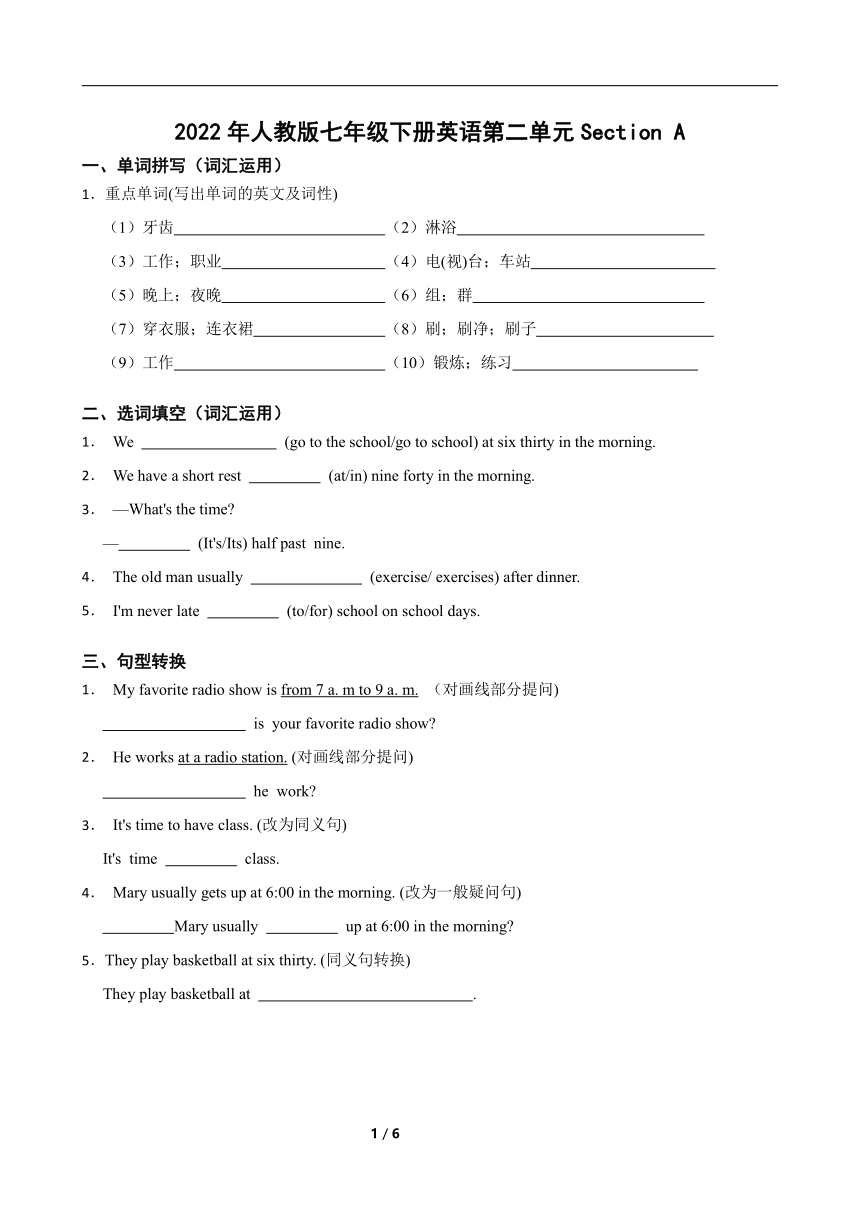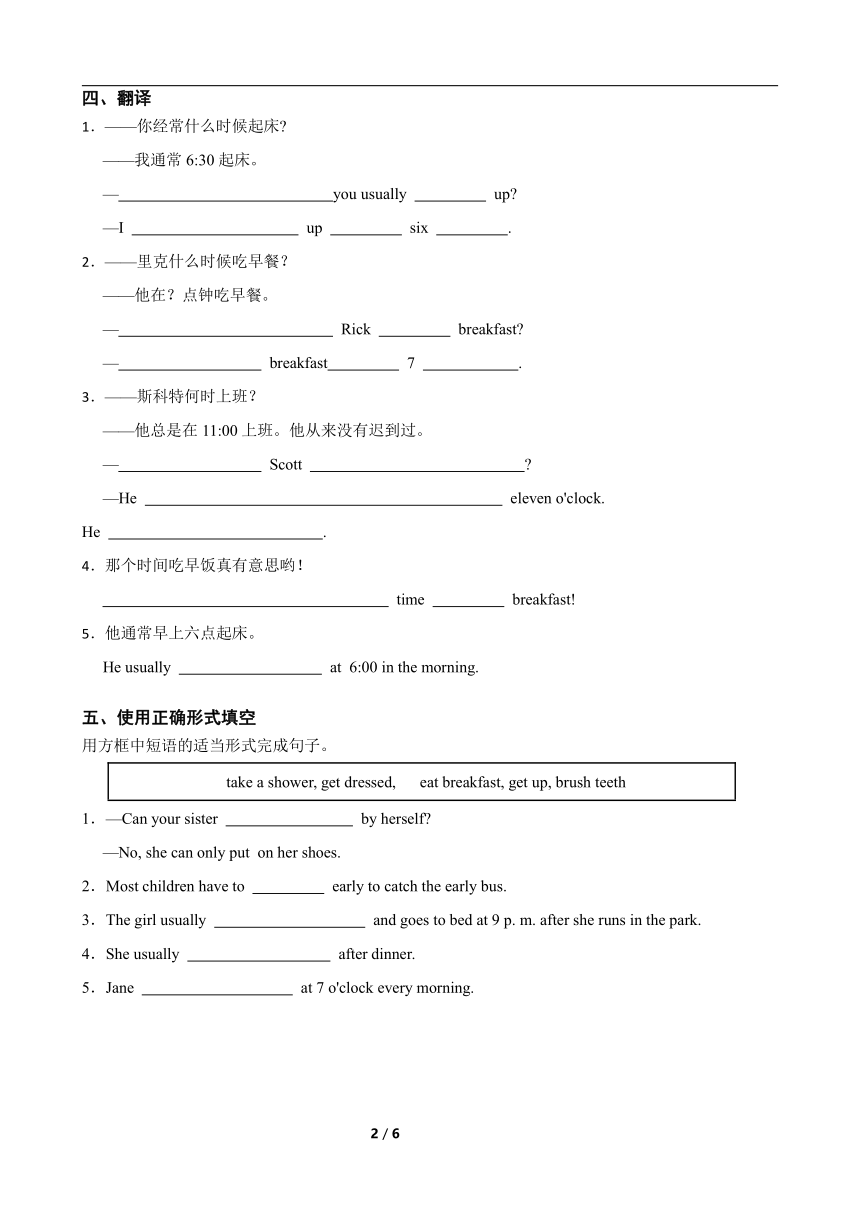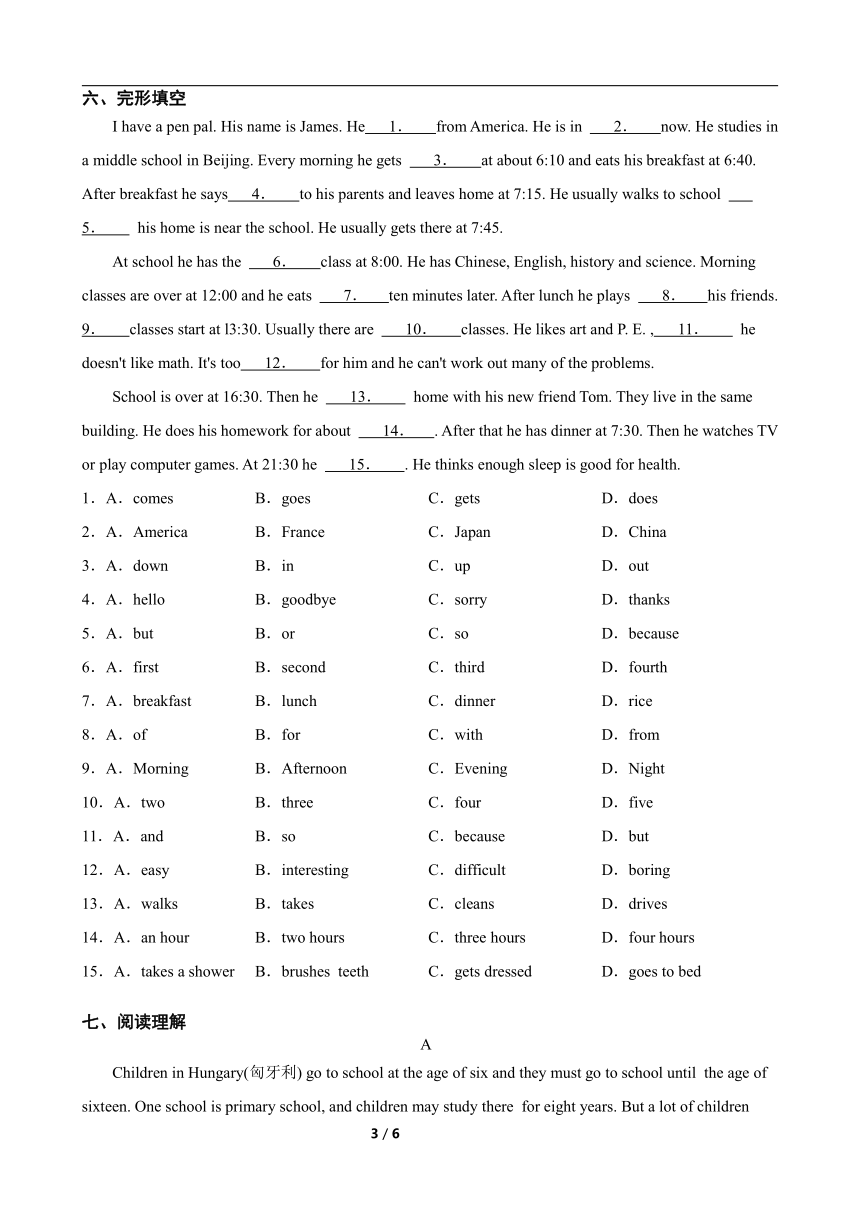2022年人教版七年级下册英语检测卷第二单元 Section A(WORD无答案)
文档属性
| 名称 | 2022年人教版七年级下册英语检测卷第二单元 Section A(WORD无答案) |  | |
| 格式 | zip | ||
| 文件大小 | 57.0KB | ||
| 资源类型 | 教案 | ||
| 版本资源 | 人教新目标(Go for it)版 | ||
| 科目 | 英语 | ||
| 更新时间 | 2022-06-13 16:26:49 | ||
图片预览



文档简介
2022年人教版七年级下册英语第二单元Section A
一、单词拼写(词汇运用)
1.重点单词(写出单词的英文及词性)
(1)牙齿 (2)淋浴
(3)工作;职业 (4)电(视)台;车站
(5)晚上;夜晚 (6)组;群
(7)穿衣服;连衣裙 (8)刷;刷净;刷子
(9)工作 (10)锻炼;练习
二、选词填空(词汇运用)
1.
We
(go to the school/go to school) at six thirty in the morning.
2.
We have a short rest
(at/in) nine forty in the morning.
3.
—What's the time
— (It's/Its) half past
nine.
4.
The old man usually
(exercise/ exercises) after dinner.
5.
I'm never late
(to/for) school on school days.
三、句型转换
1.
My favorite radio show is from 7 a. m to 9 a. m. (对画线部分提问)
is
your favorite radio show
2.
He works at a radio station. (对画线部分提问)
he
work
3.
It's time to have class. (改为同义句)
It's
time
class.
4.
Mary usually gets up at 6:00 in the morning. (改为一般疑问句)
Mary usually up at 6:00 in the morning
5.They play basketball at six thirty. (同义句转换)
They play basketball at .
四、翻译
1.——你经常什么时候起床
——我通常6:30起床。
— you usually up
—I up six .
2.——里克什么时候吃早餐?
——他在?点钟吃早餐。
— Rick breakfast
— breakfast 7 .
3.——斯科特何时上班?
——他总是在11:00上班。他从来没有迟到过。
— Scott
—He eleven o'clock. He .
4.那个时间吃早饭真有意思哟!
time breakfast!
5.他通常早上六点起床。
He usually at
6:00 in the morning.
五、使用正确形式填空
用方框中短语的适当形式完成句子。
take a shower, get dressed,
eat breakfast, get up, brush teeth
1.—Can your sister
by herself
—No, she can only put
on her shoes.
2.Most children have to early to catch the early bus.
3.The girl usually
and goes to bed at 9 p. m. after she runs in the park.
4.She usually
after dinner.
5.Jane at 7 o'clock every morning.
六、完形填空
I have a pen pal. His name is James. He 1. from America. He is in 2. now. He studies in a middle school in Beijing. Every morning he gets 3. at about 6:10 and eats his breakfast at 6:40. After breakfast he says 4. to his parents and leaves home at 7:15. He usually walks to school 5. his home is near the school. He usually gets there at 7:45.
At school he has the 6. class at 8:00. He has Chinese, English, history and science. Morning classes are over at 12:00 and he eats 7. ten minutes later. After lunch he plays 8. his friends. 9. classes start at l3:30. Usually there are 10. classes. He likes art and P. E. , 11. he doesn't like math. It's too 12. for him and he can't work out many of the problems.
School is over at 16:30. Then he 13. home with his new friend Tom. They live in the same building. He does his homework for about 14. . After that he has dinner at 7:30. Then he watches TV or play computer games. At 21:30 he 15. . He thinks enough sleep is good for health.
1.A.comes B.goes C.gets D.does
2.A.America B.France C.Japan D.China
3.A.down B.in C.up D.out
4.A.hello B.goodbye C.sorry D.thanks
5.A.but B.or C.so D.because
6.A.first B.second C.third D.fourth
7.A.breakfast B.lunch C.dinner D.rice
8.A.of B.for C.with D.from
9.A.Morning B.Afternoon C.Evening D.Night
10.A.two B.three C.four D.five
11.A.and B.so C.because D.but
12.A.easy B.interesting C.difficult D.boring
13.A.walks B.takes C.cleans D.drives
14.A.an hour B.two hours C.three hours D.four hours
15.A.takes a shower B.brushes
teeth C.gets dressed D.goes to bed
阅读理解
A
Children in Hungary(匈牙利) go to school at the age of six and they must go to school until
the age of sixteen. One school is primary school, and children may study there
for eight years. But a lot of children want to leave primary school earlier and
go to middle school at the age of ten or twelve.
There are two terms in
Hungarian schools. The school year begins in early September and ends in June. In
primary and middle schools, there isn't a break between the two terms. The
school day in primary and middle schools begins at eight o'clock in the morning
and there are usually five or six classes a day with ten or fifteen minutes' breaks
between them. Each class is forty-five minutes. There are no tests in primary
and middle schools, except(除了……之外)the
middle school finals.
1.Children in Hungary can leave primary school when they are _________.
A.6 B.8 C.9 D.14
2.When do the Hungarian schools have their first class
A.At 7:30 a. m. B.At 8:00 a. m.
C.At 8:30 a. m. D.At 9: 00 a. m.
3.Which of the following is TRUE according to the passage
A.Children in Hungary must study for twelve years.
B.A lot of children want to study in middle schools at the age of ten or twelve.
C.In primary and middle schools, there is a break between the two terms.
D.Children in Hungarian schools don't need to have tests.
B
Eason is a famous
singer. He lives in a beautiful old house by himself. The house has a long
history of150 years. He can see the wonderful sea from a big window in his
living room. Eason lives a simple life and doesn't care too much about what to
wear. People always see him wear a pair of jeans and a T-shirt.
Eason doesn't have to
work in an office, so he stays at home most of the time. He often gets up at about
7: 30 in the morning. After running for an hour, he has some milk and bread for
breakfast. Then he sits on the sofa and plays the guitar. How well he plays it!
There is a food store
near Eason's house. For lunch, he goes there and buys hamburgers, juice and chicken.
After lunch, he sings and writes songs. He admires singers in the 1970s, like
Lou Reed and Leonard Cohen. He doesn't have a TV. He thinks watching TV is
boring. But he likes swimming. He goes swimming in the sea in the afternoon.
In the evening, Eason
goes out with his friends. They have dinner in a restaurant together. After
that, they go to the concert and listen to the beautiful music. They
always enjoy themselves.
1.Which of the following does Eason like to wear
A. B.
C. D.
2.Where does Eason usually work
A.In the office. B.At home.
C.In the sea. D.In the music hall.
3.What is the right order in which Eason does these
①He goes swimming.
②He plays the guitar.
③He eats hamburgers.
④He writes songs.
A.①②③④ B.②①③④ C.②③④① D.①②④③
4.In a concert, people can _________.
A.enjoy music B.draw pictures C.buy a piano D.read books
八、短文填空
阅读下面短文,按照句子结构的语法性和上下文连贯的要求,在空格处填入一个适当的词或使用括号中单词的正确形式填空。
Dear Mom,
Today is Sunday. I don't go 1. school. I stay at home. So I can 2. (write) to you now. Every day, I go to school 3. seven thirty in the morning. We have four 4. (lesson) in the morning. We read 5. write in Chinese at school.
There are fifty-five students in my class. Four of 6. (they) are Americans. The other students are 7. (China). Chinese people are friendly. Now I have some Chinese 8. (friend). My classmates 9. (be) all my friends. They teach 10. (I) Chinese. I can speak a little Chinese now. Please don't worry about me.
Yours,
Kate
1 / 1
一、单词拼写(词汇运用)
1.重点单词(写出单词的英文及词性)
(1)牙齿 (2)淋浴
(3)工作;职业 (4)电(视)台;车站
(5)晚上;夜晚 (6)组;群
(7)穿衣服;连衣裙 (8)刷;刷净;刷子
(9)工作 (10)锻炼;练习
二、选词填空(词汇运用)
1.
We
(go to the school/go to school) at six thirty in the morning.
2.
We have a short rest
(at/in) nine forty in the morning.
3.
—What's the time
— (It's/Its) half past
nine.
4.
The old man usually
(exercise/ exercises) after dinner.
5.
I'm never late
(to/for) school on school days.
三、句型转换
1.
My favorite radio show is from 7 a. m to 9 a. m. (对画线部分提问)
is
your favorite radio show
2.
He works at a radio station. (对画线部分提问)
he
work
3.
It's time to have class. (改为同义句)
It's
time
class.
4.
Mary usually gets up at 6:00 in the morning. (改为一般疑问句)
Mary usually up at 6:00 in the morning
5.They play basketball at six thirty. (同义句转换)
They play basketball at .
四、翻译
1.——你经常什么时候起床
——我通常6:30起床。
— you usually up
—I up six .
2.——里克什么时候吃早餐?
——他在?点钟吃早餐。
— Rick breakfast
— breakfast 7 .
3.——斯科特何时上班?
——他总是在11:00上班。他从来没有迟到过。
— Scott
—He eleven o'clock. He .
4.那个时间吃早饭真有意思哟!
time breakfast!
5.他通常早上六点起床。
He usually at
6:00 in the morning.
五、使用正确形式填空
用方框中短语的适当形式完成句子。
take a shower, get dressed,
eat breakfast, get up, brush teeth
1.—Can your sister
by herself
—No, she can only put
on her shoes.
2.Most children have to early to catch the early bus.
3.The girl usually
and goes to bed at 9 p. m. after she runs in the park.
4.She usually
after dinner.
5.Jane at 7 o'clock every morning.
六、完形填空
I have a pen pal. His name is James. He 1. from America. He is in 2. now. He studies in a middle school in Beijing. Every morning he gets 3. at about 6:10 and eats his breakfast at 6:40. After breakfast he says 4. to his parents and leaves home at 7:15. He usually walks to school 5. his home is near the school. He usually gets there at 7:45.
At school he has the 6. class at 8:00. He has Chinese, English, history and science. Morning classes are over at 12:00 and he eats 7. ten minutes later. After lunch he plays 8. his friends. 9. classes start at l3:30. Usually there are 10. classes. He likes art and P. E. , 11. he doesn't like math. It's too 12. for him and he can't work out many of the problems.
School is over at 16:30. Then he 13. home with his new friend Tom. They live in the same building. He does his homework for about 14. . After that he has dinner at 7:30. Then he watches TV or play computer games. At 21:30 he 15. . He thinks enough sleep is good for health.
1.A.comes B.goes C.gets D.does
2.A.America B.France C.Japan D.China
3.A.down B.in C.up D.out
4.A.hello B.goodbye C.sorry D.thanks
5.A.but B.or C.so D.because
6.A.first B.second C.third D.fourth
7.A.breakfast B.lunch C.dinner D.rice
8.A.of B.for C.with D.from
9.A.Morning B.Afternoon C.Evening D.Night
10.A.two B.three C.four D.five
11.A.and B.so C.because D.but
12.A.easy B.interesting C.difficult D.boring
13.A.walks B.takes C.cleans D.drives
14.A.an hour B.two hours C.three hours D.four hours
15.A.takes a shower B.brushes
teeth C.gets dressed D.goes to bed
阅读理解
A
Children in Hungary(匈牙利) go to school at the age of six and they must go to school until
the age of sixteen. One school is primary school, and children may study there
for eight years. But a lot of children want to leave primary school earlier and
go to middle school at the age of ten or twelve.
There are two terms in
Hungarian schools. The school year begins in early September and ends in June. In
primary and middle schools, there isn't a break between the two terms. The
school day in primary and middle schools begins at eight o'clock in the morning
and there are usually five or six classes a day with ten or fifteen minutes' breaks
between them. Each class is forty-five minutes. There are no tests in primary
and middle schools, except(除了……之外)the
middle school finals.
1.Children in Hungary can leave primary school when they are _________.
A.6 B.8 C.9 D.14
2.When do the Hungarian schools have their first class
A.At 7:30 a. m. B.At 8:00 a. m.
C.At 8:30 a. m. D.At 9: 00 a. m.
3.Which of the following is TRUE according to the passage
A.Children in Hungary must study for twelve years.
B.A lot of children want to study in middle schools at the age of ten or twelve.
C.In primary and middle schools, there is a break between the two terms.
D.Children in Hungarian schools don't need to have tests.
B
Eason is a famous
singer. He lives in a beautiful old house by himself. The house has a long
history of150 years. He can see the wonderful sea from a big window in his
living room. Eason lives a simple life and doesn't care too much about what to
wear. People always see him wear a pair of jeans and a T-shirt.
Eason doesn't have to
work in an office, so he stays at home most of the time. He often gets up at about
7: 30 in the morning. After running for an hour, he has some milk and bread for
breakfast. Then he sits on the sofa and plays the guitar. How well he plays it!
There is a food store
near Eason's house. For lunch, he goes there and buys hamburgers, juice and chicken.
After lunch, he sings and writes songs. He admires singers in the 1970s, like
Lou Reed and Leonard Cohen. He doesn't have a TV. He thinks watching TV is
boring. But he likes swimming. He goes swimming in the sea in the afternoon.
In the evening, Eason
goes out with his friends. They have dinner in a restaurant together. After
that, they go to the concert and listen to the beautiful music. They
always enjoy themselves.
1.Which of the following does Eason like to wear
A. B.
C. D.
2.Where does Eason usually work
A.In the office. B.At home.
C.In the sea. D.In the music hall.
3.What is the right order in which Eason does these
①He goes swimming.
②He plays the guitar.
③He eats hamburgers.
④He writes songs.
A.①②③④ B.②①③④ C.②③④① D.①②④③
4.In a concert, people can _________.
A.enjoy music B.draw pictures C.buy a piano D.read books
八、短文填空
阅读下面短文,按照句子结构的语法性和上下文连贯的要求,在空格处填入一个适当的词或使用括号中单词的正确形式填空。
Dear Mom,
Today is Sunday. I don't go 1. school. I stay at home. So I can 2. (write) to you now. Every day, I go to school 3. seven thirty in the morning. We have four 4. (lesson) in the morning. We read 5. write in Chinese at school.
There are fifty-five students in my class. Four of 6. (they) are Americans. The other students are 7. (China). Chinese people are friendly. Now I have some Chinese 8. (friend). My classmates 9. (be) all my friends. They teach 10. (I) Chinese. I can speak a little Chinese now. Please don't worry about me.
Yours,
Kate
1 / 1
同课章节目录
- Unit 1 Can you play the guitar?
- Section A
- Section B
- Unit 2 What time do you go to school?
- Section A
- Section B
- Unit 3 How do you get to school?
- Section A
- Section B
- Unit 4 Don't eat in class.
- Section A
- Section B
- Unit 5 Why do you like pandas?
- Section A
- Section B
- Unit 6 I'm watching TV.
- Section A
- Section B
- Review of Units 1-6
- Unit 7 It's raining!
- Section A
- Section B
- Unit 8 Is there a post office near here?
- Section A
- Section B
- Unit 9 What does he look like?
- Section A
- Section B
- Unit 10 I'd like some noodles.
- Section A
- Section B
- Unit 11 How was your school trip?
- Section A
- Section B
- Unit 12 What did you do last weekend?
- Section A
- Section B
